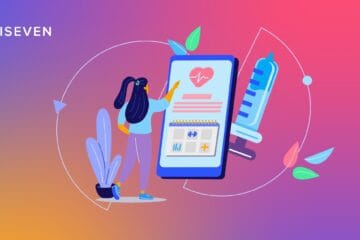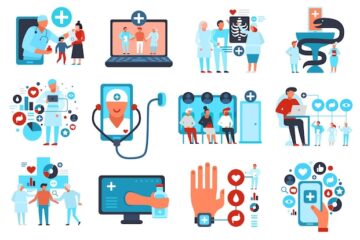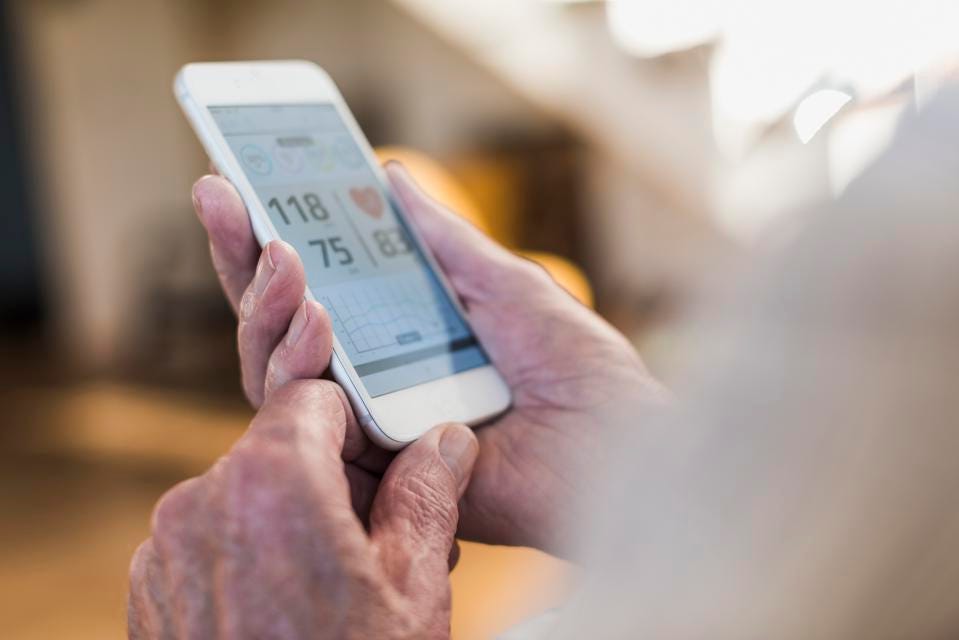
In a shed next to his Portsmouth home, former soldier Paul Quinn plugs into state-of-the-art technology, costing only £20 and operated through his iPad, to manage his chronic, life-threatening respiratory disease. He exercises there with his wife Elizabeth, guided by printouts of routines he has pasted to the walls.
Since the 64-year-old started using the chronic obstructive pulmonary disease (COPD) management app he has lost weight, his depression has lifted, he sees his GP once a year (compared with twice-monthly visits previously) and he has not needed hospital treatment for 18 months. Quinn says he has his life back. This is not what he expected three years ago after developing acute breathing problems and being diagnosed with COPD. At that time he was handed an end-of-life pamphlet.
Digital transformation
Chronic disease dominates the expenditure of the cash-strapped NHS. COPD is one of a number of chronic conditions including diabetes, arthritis and heart disease which, according to NHS England figures, affect 15.4 million people and absorb 70% of the budget. Heavy investment is being channelled into all areas of technology by NHS England but its greatest hopes for IT are in tackling chronic disease.
Juliet Bauer, the new director of digital experience for NHS England, says: “The system we have presented to patients up to now has been too difficult to use. People want simplicity and to be able to manage their experiences regardless of disease.”
The transformation of Quinn’s life has come about from using an app called myCOPD every day. The programme’s bright, simple layout means he can easily assess his symptoms and make decisions on medication use to prevent respiratory crises. Information is shared with his GP and his consultant, who in turn can keep tabs on whether he is struggling and might need to be seen. His medication is tracked, ordered and delivered, without Quinn needing to travel to the surgery. Quinn says: “For me the app has been a life saver and for the NHS it has saved an absolute fortune”.
He has hit the nail on the head. COPD costs the NHS more than £800m each year in treatment alone, not to mention the costs of caring and days of work lost. MyCOPD costs just £20 per patient.
The app was developed by respiratory specialist Dr Simon Bourne, working as part of a team of healthcare and tech experts called My mhealth, who are committed to finding digital solutions to managing long-term conditions. Bourne despaired at the poor outcomes for patients with this condition and the lack of availability of pulmonary rehabilitation places.
After evaluation by the NHS Innovation Accelerator and the National Institute for Health Research’s Small Business Research Initiative, the app is now used by 1,700 patients throughout the UK. The patients are based in 22 different clinical commissioning group areas and it has been estimated to save each between £200,000 to £300,000 in the first year alone, according to Department of Health figures.
“We have proved that if you put the right tool in patients’ hands, they really can become experts in their condition and transform the way they use healthcare facilities,” says Bourne. Apps for managing diabetes and asthma were released in October, and another for heart failure will follow in spring 2017.
Staying connected
Almost everyone has a mobile or a tablet and people often prefer interacting with digital technology to visiting hospital, as has been proven by the Dawn (Diabetes Appointments via Webcam in Newham) scheme, which was aimed at 16 to 25-year-olds with diabetes in the disadvantaged area of Newham in east London.
Only 11% of young patients with type 1 diabetes here were properly controlled, and persuading them to attend appointments was a struggle. At the young people’s request, however, Newham CCG and Barts health NHS trust introduced Skype appointments. Non-attendance rates dropped from 28% to 16%. The young diabetics also felt clinicians concentrated on them more fully during Skype appointments. Based on Dawn’s success, a service called Vocal has been developed for people after cancer surgery.
Social prescribing can also be boosted by technology. In the Creggan estate in Derry, one of the poorest areas of Northern Ireland, a 12-week pilot programme is being rolled out by social prescribing software company Elemental. Through using its software, 56 pre-diabetic participants had the choice of more than 40 different activities relating to diet, motivation and mental health. All participants lost weight – some as much as 4 stone – by engaging with the programme. Now eight NHS organisations in England are set to sign up to Elemental’s scheme.
The pressure to move ahead with technology is clear from the number of IT initiatives announced by the Department of Health over the summer, but it is crucial to first assess whether they are effective and add value.
Work is underway to help clinicians choose and recommend reputable apps, starting with mental health, diabetes and COPD. The NHS’s first chief clinical information officer, Keith McNeil, a former transplant specialist, says that “for the NHS to move quickly we need to put in place a rigorous system and get the balance right between the need for innovation and getting it right for the patient”.
[Source:-THE GUARDIAN]




